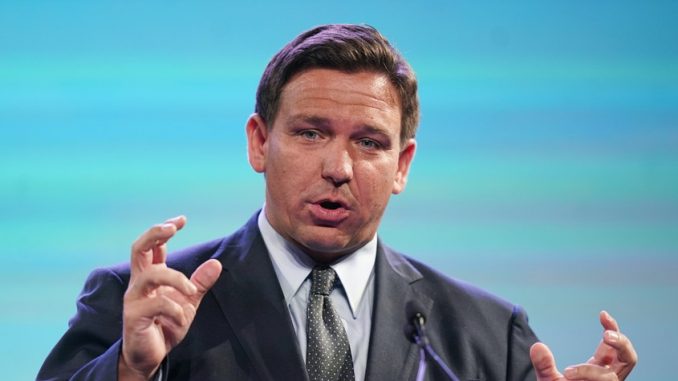
Today the Florida State Senate passed a bill that is called the “don’t say gay” bill by Democrats and the “parental rights in education” bill by Republicans with a 22 to 17 vote. It now goes to the desk of Governor DeSantis who will sign it into law. The bill addresses the education of very young children from kindergarten to third grade. The narrative in the media and coming from Democrats (but I repeat myself) is that it is anti-gay legislation. That is not the truth.
In February, HB 1557 passed in Florida’s House of Representatives. It is a part of a larger effort by the Florida legislature to address parental rights in the education of their children. One thing the pandemic did was to close schools which meant that children were educated online at home. Parents got an up-close and personal lesson in what exactly is being taught in schools and some of it was not acceptable to them. One such area is with the inclusion of sex in lessons, specifically the LGBTQ agenda. Children that are aged five to eight are too young to be subjected to discussions on gay or transgender issues, as well as gender identity or even the basic definitions of being a boy or a girl. It’s exploitation by progressive adults, sexualizing children too young to be interested in the topics or to understand the subject.
HB 1557 prohibits classroom instruction about sexual orientation or gender identity in kindergarten through third grade, or at any grade level if it’s deemed not age or developmentally-appropriate.
In today’s hyper-woke atmosphere, that simple acknowledgement that very young children should not have to learn about mature topics in early elementary school years is just too much. It was dubbed the “don’t say gay” bill in an overreaction to the legislation.
“It sends a terrible message to our youth that there is something so wrong, so inappropriate, so dangerous about this topic that we have to censor it from classroom instruction,” Rep. Carlos Guillermo Smith, D-Orlando, who is gay, said on the House floor Thursday.
It also bars school personnel from discouraging or prohibiting the notification of parents or parental involvement in critical decisions affecting a student’s mental, physical or emotional health or well-being.
Republicans call it the “parental rights in education” bill because of the stipulation that parents be notified about subject matter in schools. What a concept, right? In the youngest of children, their brains are not developed enough to understand sex between their own parents, much less adults in general. It’s just not appropriate. Older students and the teachers union criticized the legislation with high school students leading protests against it.
The Florida Education Association teachers union criticized the bill and HB 7 – known as the “Individual Freedom” bill – as “censorship” legislation that will “limit what schools can say and teach regarding our nation’s history and regarding issues related to students who are part of or associated with the LGBTQ+ community.”
“Educators love their students. We all want to make sure that every child can grow and thrive, regardless of race, background, ZIP code or ability,” Florida Education Association President Andrew Spar said in a statement. “These bills mean some of our students will no longer feel safe and secure, or even seen, based on who they are.
“Both bills promote discrimination and censorship, and send the clearly un-American message to students that individuality is not valued, that everyone must conform to a single point of view.”
A lot of parents would be cynical about “educators loving their students” after almost two years of fighting teacher unions over school closures. That aside, no one wants a child to feel “not valued” or conform to one point of view. The problem is that progressives think their point of view is the only one and everyone else agrees. Otherwise opponents are labeled as homophobic or anti-LGBTQ. What Republicans are pushing for, though, is allowing young children to just be children. The teacher can monitor a student-led discussion on LGBTQ issues, should a child bring it up in class, but it will not be allowed to be a routine part of a class’s curriculum. A young child may bring up that he or she has two moms, for example, and that can start a conversation in a classroom. It’s important that it is an age appropriate discussion.
DeSantis — who is seeking reelection — has backed the proposal. If he signs it into law, parents would be allowed to sue school districts or take their concerns to the State Board of Education if they believe their child’s school has violated the measure’s provisions. “How many parents want their kindergarteners to have transgenderism or something injected into classroom instruction? I think those are very young kids. I think the Legislature is basically trying to give parents assurance that they are going to be able to go and that stuff is not going to be there,” DeSantis told reporters in Jacksonville last week.
DeSantis isn’t stupid. He saw what happened in Virginia when parents rose up against decisions being made by educators in that state. The state flipped from a deep blue one to a red state in its last election, largely due to those parents.
Protesters at the state capitol chanted, “We say gay,” on Monday. Democrats and the media portray the legislation as a ban on language, for example, and that is just silly. Nonetheless, grown adults protested with such chants. Governor DeSantis was asked to answer to his critics on Monday and he answered perfectly. Some Republican politicians are finally learning to push back on false media narratives on GOP legislation. DeSantis knows how to do that.
Reporter: “Critics call it the Don’t Say Gay bill”
DeSantis: “Does it say that in the bill?”
Reporter: “It bans classroom instruction on sexual identity and gender orientation.”
DeSantis: “For who?… Grades Pre-K through 3.”
pic.twitter.com/gqMiYKyVzg— Greg Price (@greg_price11) March 7, 2022
Via Hot Air
